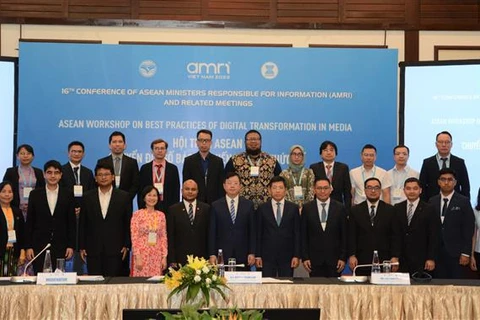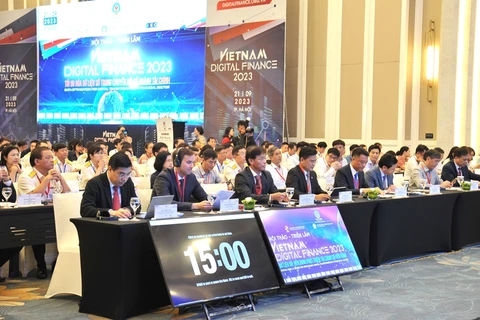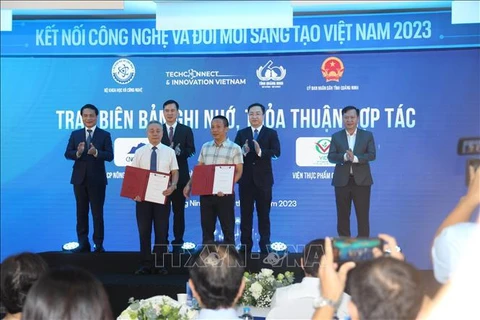 Copyright infringement of cultural industry products is becoming a burning issue. (Photo: VietnamPlus)
Copyright infringement of cultural industry products is becoming a burning issue. (Photo: VietnamPlus) Hanoi (VNA) - Handling copyright infringement in cyberspace takes a lot of time and efforts because sites that pirate digital content have many ways to circumvent legal provisions. These sites are often highly skilled in bypassing artificial intelligence (AI) screening software.
As digital transformation in every country in the world has become a vital trend, the issue of copyright infringement in cyberspace has emerged as an "epidemic" that continuously erodes culture and creativity and community mental health.
“New land” of infringement
Under the Government’s Decision No. 348/QD-TTg dated April 6, 2023 approving the strategy on "press digital transformation to 2025, orientation to 2030", there is a goal that all press agencies will post contents on digital platforms.
Accordingly, by 2030, all press agencies in the country will post their contents on digital platforms, 90% of them will use data analytics and aggregation platforms and AI applications to optimise operations. All press agencies will operate in the form of media convergence and models which are suitable with the development of advanced science and technology in the world, producing content according to digital journalism trends.
It can be affirmed that digital content creation has become a potential "new land" for content producers, brands, and digital advertising businesses. With just one click, internet users can buy their goods online, search and share videos or enjoy a football match. Applications and utilities of the digitalisation process have stepped into every aspect of public life.
Favourable policies and the rapid development of digital technology have created momentum for general development, and at the same time, it is in the field of digital content that problems and inadequacies regularly arise, especially those related to copyright.
A survey of the Asia Coalition Against Piracy (CAP) shows that Vietnam has a high rate of copyright infringement in online content streaming services, social networks or online messages. Specifically, up to 41% of violations occurred on social networking platforms and messaging applications; 19% through streaming. The rate of use of pirated platforms also accounts for 61%.
 The 2012 Publishing Law still has many limitations regarding the management of electronic publishing (Photo: VietnamPlus)
The 2012 Publishing Law still has many limitations regarding the management of electronic publishing (Photo: VietnamPlus) According to the Vietnam Digital Content Copyright Centre, currently copyright infringement in the digital environment has been taking place openly on many platforms because users still tend to prefer to use non-copyrighted content.
The age of most violators ranges from 18 to 24, with the rate of using pirated content up to 65% as pirated websites are willing to provide content at very cheap prices or even for free just to get users. Common forms of digital copyright infringement include livestreaming on social networks or websites, copying the original contents that have been broadcasted or editing videos then posting them illegally onto internet platforms.
This "plague" has caused many serious consequences such as loss of tax revenue for the state and damage to Vietnam's reputation among foreign investors. In the video content segment alone, a report by Media Partners Asia said in 2022, there was an estimated 15.5 million violators, causing a loss of 348 million USD, accounting for 18% of the entire legal video industry's revenue. If there are no specific measures to prevent the issue, experts estimate the figure will increase to 19.5 million people by 2027, causing a loss of about 456 million USD.
“For a Resilient and Adaptive ASEAN”
Within the framework of the 16th Conference of ASEAN Ministers Responsible for Information (AMRI 16) and 7th Conference of ASEAN Plus Three Ministers Responsible for Information (AMRI+3) taking place in Da Nang from September 22 to 23, according to Vietnam's initiative, for the first time ASEAN member states discussed the topic of digital transformation in media, particularly copyright infringement in the digital space, sharing stories about protecting journalistic copyright on digital platforms.
 The 16th Conference of ASEAN Ministers Responsible for Information and 7th Conference of ASEAN Plus Three Ministers Responsible for Information taking place in Da Nang from September 22 to 23 (Photo: VNA)
The 16th Conference of ASEAN Ministers Responsible for Information and 7th Conference of ASEAN Plus Three Ministers Responsible for Information taking place in Da Nang from September 22 to 23 (Photo: VNA) Vietnam's initiatives at the conference were of interest to ASEAN member states. Deputy Minister of Information and Communications Nguyen Thanh Lam said that ASEAN member states have reached a high consensus on joining hands to seek common solutions in handling copyright infringement. Vietnam affirms that new technologies have both positive and negative effectswhich, if not well controlled, will affect the community and people; causing political, economic and social consequences. ASEAN must join hands to create common regulations so that all cross-border media platforms must comply with the laws and codes of conduct of each country and ASEAN region.
Weak “vaccine” for copyright infringement
It can be said that the press, radio and television are the first fields that are severely affected by the digital technology boom when traditional forms of media gradually lose market share and revenue to cross-border platforms.
The immediate and inevitable consequences that follow are problem of copyright infringement for content on digital platforms, a significant aspect of which is copyright infringement in cyberspace in the field of publishing.
While the “virus” of copyright infringement is multiplying with more and more dangerous variants, prevention “vaccines” against them is not strong enough as there remain limitations in State management capacity, business administration capacity and users’ awareness.
Even though Vietnam has already put in place a rather complete legal system on copyright protection, the tackling of violations face many challenges due to new technologies in the field. In addition, three agencies are responsible for the management of content on the internet so the administrative procedures for handling of violations takes a lot of time.
Digital content creation has become a "new land" for content producers, brands, and digital advertising businesses. (Photo: VietnamPlus)
Agencies need to share data to coordinate more effectively. In addition, sanctions must also be more stringent, for example, the highest administrative fine at present is 150 million VND, while a pirated website reporting football and organizing football betting online gambling can earn billions of VND.
Synchronising solutions
More than ever, the State needs to have clear regulations on methods and mechanisms for managing users on social networking sites and e-commerce platforms; clearly state the responsibility of e-commerce trading platforms for ensuring quality, origin of goods and reliability of the goods suppliers.
It is necessary to build a common coordination mechanism between storage service providers, network operators and units that handle copyright infringement issues for the quick and effective actions against violations while introducing mechanisms to handle copyright infringements. At the same time, strict sanctions are needed for violations.
Handling copyright infringement in cyberspace takes enourmous effort and time because sites that pirate digital content have many ways to circumvent the law, even bypassing AI, causing great difficulties for authorised units in the process of detection and sanction.
In order to tighten management and force relevant parties to enforce intellectual property rights, copyrights and related rights, especially in the digital environment, Article 198b of the Intellectual Property Law 2022 clearly stipulates that intermediary service providers are responsible for implementing technical measures and coordinating the protection of copyright and related rights in telecommunications network and internet environment.
The stipulation is an important measure in the fight against copyright infringement, because pirated websites, no matter what international domain name they use, where their servers are located, or how they hide information, still have to use the services of intermediary businesses in Vietnam, specifically network operators. /






















